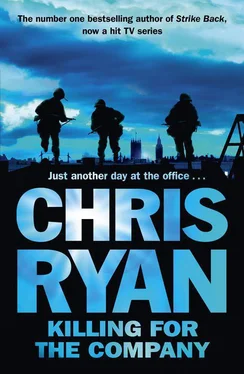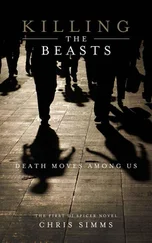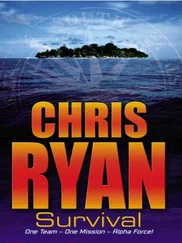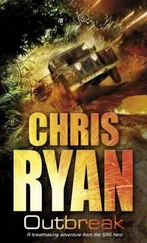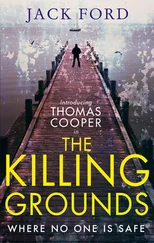Back at the central island he helped himself to another long chef’s knife before moving over to one of the large toasters along the side worktop. He loosened a couple of pages from the newspaper, stuffed them into the toaster and pushed down the lever.
Thirty seconds before they caught fire, he reckoned. Thirty seconds to get the fuck out of there.
Luke hurried towards the door that led into the dining area. He quickly let himself out, shut the door behind him and disabled it with the knife. And then he ran.
In the end it took just over thirty seconds for the gas to ignite. Luke was about ten metres from the canteen when a massive explosion erupted behind him. He felt the heat against his back as the twilight glowed suddenly orange while he walked calmly away. Over to his left, seventy-five metres away, he could see men congregating outside the Regiment buildings. But all around him panic was breaking out. Men running and shouting. Nobody knew it was an exploding gas main — no doubt they’d all assume it was a Palestinian missile got lucky. Immediately Luke found himself among a chaotic crowd of soldiers, some of them sprinting towards the source of the explosion, some sprinting away. But all of them camouflaging him just the way he wanted.
Twenty metres ahead he clocked a WMIK. The driver had stopped and climbed out of the vehicle. As Luke approached he saw him running in the direction of the canteen, leaving the driver’s door open and — he realised ten seconds later once he was alongside — the engine running. He looked over his shoulder. Great clouds of smoke were billowing up from the canteen, three military vehicles had screeched up in front of it and everyone’s attention was on the burning building.
Which meant nobody gave Luke a second glance as he slipped into the driver’s seat of the WMIK, turned the vehicle round 180 degrees and drove away.
If he floored the WMIK, he could be at the exit barrier in three minutes. But to speed through the built-up area would just draw attention to himself. It took all his self-restraint to accelerate slowly, his Sig on the dashboard where he could reach it easily and his hand resting gently on the gear stick in case he suddenly needed to shift. In the passenger seat was a Bergen. It looked like it was full of gear, but Luke had no time to check it.
Thirty seconds. A hundred metres. More soldiers were running towards the canteen. Another fifty metres along, he passed the hangar containing the F-16. On the night they’d arrived, it had been surrounded by mechanics. There was nobody in the hangar tonight. The aircraft was ready to fly.
Rain started to spot the windscreen. Luke turned on the wipers and the glass became immediately smeared with dust. It took a few seconds to clear, by which time he was driving past an equipment warehouse.
Suddenly he remembered the satellite marker strapped to his left arm. It was still attached from the op and it meant the ops centre could track him to within a couple of metres. He struggled to remove it from his arm while steering with one hand, then wound down the window, ready to ditch it. But just then he saw something better. A logistics truck was approaching, its driver clearly unaware of the chaos ahead and its open-topped back piled with full bin bags. As it trundled past the WMIK, Luke chucked the marker up on to the top of the bags and watched in the rear-view mirror as the truck headed in the opposite direction. If the marker had remained still, anyone tracking would have realised he’d just dumped it; if it was moving, maybe he’d buy himself a bit of extra time.
He continued to drive steadily towards the exit of the base.
A minute passed. Five hundred metres of ground. He’d cleared the main part of the camp so he accelerated up to 70 kph, but kept looking in the rear-view mirror expecting to see vehicles speeding towards him; or maybe a chopper would land effortlessly on the road in front of him. Neither event happened, but his mouth was still dry when, a couple of minutes later, he saw the main entrance 300 metres ahead: a high wire fence with barbed wire rolled across the top, a sentry point with two guards and a lowered barrier.
Luke slowed down, reached for his Sig and rested it on his lap. Regiment SOP would be to nail the two sentries before they had a chance to raise the alarm…
He drove towards the barrier.
It was sixty metres away.
Fifty.
Lights in the rear-view mirror. Headlamps. Three sets. They were moving quickly.
Luke accelerated. It was his only option: pick up enough speed and the barrier couldn’t stop him.
The rain was falling more heavily. The figures of the two guards were indistinct, but he could see them standing by the barrier, assault rifles slung across their fronts. It didn’t look like they’d clocked him yet. If he burst through, it would shag the front of the WMIK and they’d certainly fire on him. Assault rifles could take out his tyres, shatter the rear window — but at least he’d be out of the camp.
He accelerated some more.
Thirty metres to go.
Twenty.
The headlamps behind him were getting closer.
Suddenly, and to Luke’s astonishment, the barrier rose. Had word not reached the sentries? Were the headlamps behind just regular army vehicles? He wasn’t going to stop and find out. Seconds later he was speeding through the barrier. He caught sight of one of the guards, who looked surprised that the Land Rover had zoomed through at such a rate. But the day was drawing to a close, and it was raining hard. By the time Luke looked in the mirror again, the barrier had closed behind him and the sentry was taking shelter.
He kept his foot down and his eyes firmly on the road ahead. He’d been lucky, and experience told him that such luck seldom lasted. He tried to get his head straight. Stratton was at Ben Gurion — if he hadn’t already flown. The security there was fucking ridiculous. On his own, Luke would never get close to him.
He had only one choice. To get to Jerusalem. Because if he didn’t pull something out of the bag by eleven o’clock tomorrow, Stratton and Maya Bloom’s plans would come to fruition.
Which meant that right now his only friend was speed.
The air at Ben Gurion was thick with rain. It poured on to the chassis of a UN cargo TriStar as it refuelled, and on to the military presence — heavy, even for Ben Gurion — that surrounded it. An armoured Jeep was cutting through the darkness across the airfield from a nearby helicopter pad. The vehicle stopped just a couple of metres from the steps that had been placed at the rear of the TriStar. Two armed personnel climbed out of the front of the Jeep, and one of them opened the rear door to allow a thin man to exit.
Alistair Stratton looked a far cry from the smart, statesmanlike politician the world knew. His skin was smeared with dirt, blood and sweat; his nose was clearly broken; his clothes, in places, were torn. But although this usually unruffled figure looked like he’d been plucked from a war zone, it was not this that was most noticeable about it him. The Middle East peace envoy looked like peace was the last thing on his mind.
Soaked by the rain, he swiftly entered the body of the TriStar. He stood in its cavernous body, surrounded by crates of equipment and even a number of vehicles marked with white UN lettering, the scrapes and shouts of equipment being loaded echoing all around him. A second man approached, wearing camouflage gear and a UN armband. When he spoke, however, his clipped tones identified him as a British soldier, and an officer at that.
‘We should be off the ground in half an hour, sir.’
‘Why so long?’ Stratton’s voice was hoarse.
‘We’ve just received a communication from B Squadron SAS.’
The former PM looked at him sharply. ‘What?’
Читать дальше
